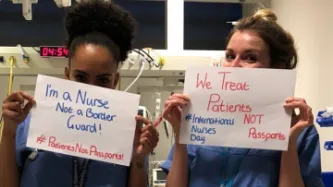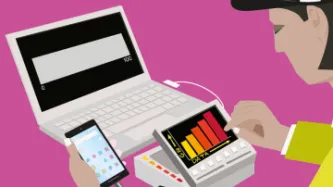Search
Content type: Examples
The new Singaporean app, TraceTogether, developed by the Government Technology Agency in collaboration with the Ministry of Health was launched on March 20 after eight weeks of development. The app, which can be downloaded by anyone with a Singapore mobile number and a Bluetooth-enabled smartphone, asks users to turn on Bluetooth and location services, and enable push notifications. The app works by exchanging short-distance Bluetooth signals between phones to detect other users within two…
Content type: Examples
Technology such as Hong Kong's electronic monitoring bracelets, used to ensure that people do not break their mandated quarantine, may appear reasonable during a pandemic, but could be problematic if deployed widely and used to identify those who have joined anti-government protests. The same applies to emergency legislation such as that passed by the UK government granting the government extraordinary new powers to shut down airports and ban gatherings. History provides examples:…
Content type: Examples
The Greek government issued a ban on all unnecessary traffic from March 23 to April 6 in order to stop the spread of the coronavirus. Anyone moving around under one of the list of exceptions must carry a police identity card or passport and a certificate of movement, which citizens obtain by filling out an online form (at form.gov.gr), or by filling out a paper form listing the reason for leaving home, or by sending an SMS. Employees are issued a certificate by their employer. The government…
Content type: Advocacy
The letter has been signed by more than 40 organisations and it is open for individuals to sign.
At the moment, the Department of Health and Social Care has given no assurance that NHS data will not be shared with the Home Office and used for immigration enforcement, including for those people with a confirmed coronavirus diagnosis.
Assurances which were confirmed by the Irish government as part of their response to COVID-19: last week, during a Parliamentary debate, Irish Minister of Health…
Content type: Examples
Russia has set up a coronavirus information centre to to monitor social media for misinformation about the coronavirus and spot empty supermarket shelves using a combination of surveillance cameras and AI. The centre also has a database of contacts and places of work for 95% of those under mandatory quarantine after returning from countries where the virus is active. Sherbank, Russia's biggest bank, has agreed to pay for a free app that will provide free telemedicine consultations.
Source:…
Content type: Examples
Hong Kong is issuing electronic tracker wristbands to people under compulsory home quarantine to ensure they do not go out. The wristbands are accompanied by a mandatory smartphone app that shares their location with the government via messaging platforms such as WeChat and WhatsApp. Upon arriving at the place where they are quarantined, users walk around the corners so the technology can track the space in which they are confined.
Source: https://www.cnbc.com/2020/03/18/hong-kong-uses-…
Content type: Examples
The Serb-dominated Republika Srpska, one of two entities that make up Bosnia and Herzegovina, is introducing fines of €500 to €1,500 (individuals) or €3,000 to €9,000 for spreading "panic and disorder" by publishing false news about the coronavirus outbreak in the media and on social networks.
Source: https://balkaninsight.com/2020/03/19/bosnias-republika-srpska-imposes-fines-for-coronavirus-fake-news/
Writer: Danijel Kovacevic
Publication: BalkanInsight
Content type: Examples
The Paraguayan Minister of Defense, Bernardino Soto Estigarribia, announced that from March 17 onward restrictions on movement and crowds would be enforced by the military along with the police forces. The minister said it should not be thought of as a violation of human rights because the military understand the importance of respect. The country declared a state of emergency on March 16.
Source: https://www.ultimahora.com/covid-19-militares-tambien-controlaran-circulacion-personas-…
Content type: Examples
The presidential decree declaring a health emergency in Paraguay empowers the Ministry of Public Health to order "general preventive isolation" from 8:00 p.m. to 4:00 a.m, with exceptions for those doing vital work such as delivering food or transportation. The Ministry of the Interior and its police forces patrol the streets to enforce the measures.
Sources:
https://news.yahoo.com/military-roadblocks-curfews-latin-america-023213811.html
https://www.presidencia.gov.py/archivos/documentos/…
Content type: Video
You’re a witness or a victim or a suspect of a crime; or even just travelling going on holiday. Officials demand your phone, then disappear with it. What happened to your phone? What happened to your data? What will happen to you?
We all generate vast amounts of data using our mobile phones - more than most of us are aware of - and that data has become increasingly attractive to law enforcement agencies around the world, enabled by ‘extraction technologies’ supplied by companies like…
Content type: Advocacy
In December 2019 Privacy International made submissions to Police Scotland in relation to documents designed to explain to the public how cyber kiosks will work and what information will be given to victims when Police Scotland extract data from their phone.
Police Scotland rely on 'consent' to seize a phone from a victim. We believe the lack of information provided to the individual regarding extraction, examination, retention, deletion, sharing and search parameters undermines that any…


